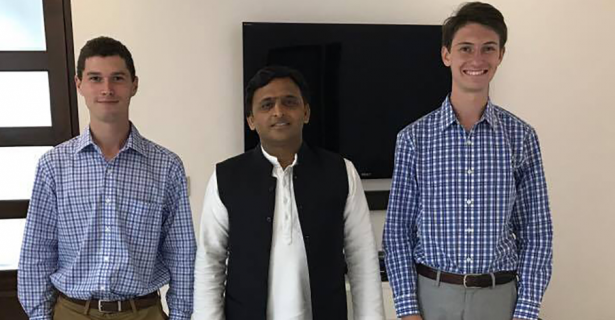We both took EPIIC this past year, which looked at “Order and Chaos” around the globe, with an emphasis second semester on the rise of populism. We became interested in understanding what this meant in India, and in looking what accounted for the rise of the BJP.
We started the morning, like we have every day this week, with a steaming cup of chai and a bun makhan from the local street stall. Fifty rupees, or 78 cents, is enough for a Lucknow breakfast. Often, we are asked where we are from. When we answer “America”, some people’s eyes light up as they reply “ah, America!” and extend a hand to shake, some tell us they wish to go someday, and some simply ask “Donald Trump?”
One Delhi professor we interviewed explained that many Indians see America as a model. Big homes, big cars, big army. India is a nation aspiring to a middle class lifestyle, and frustrated, he told us, by the long wait to get there. This frustration appears to have become a catalyst for political change, in our opinion, driving much of the BJP’s recent success.
In particular, many interviewees have stressed the critical importance of the youth vote, and the employment bottleneck in India, citing these as main factors in the BJP’s 2014 general election victory. However, many have also noted a shift in political narrative towards cultural issues as progress on development ostensibly stalls.
These issues briefly escaped our minds as we were whisked away from a press conference at Samajwadi Party’s Lucknow office by armed security guards into a convoy and ferried to the former Chief Minister’s estate. We’d gotten here through an absurdly long chain of contacts that started with EPIIC professor Manuel Muñiz. We certainly never would have expected to interview a high-profile opposition leader like Akhilesh Yadav when we started this project.
We arrived in Delhi on the night of the 21st and have since interviewed a wide range of experts, from professors on both the left and the right of the political spectrum, to politicians, journalists, businessmen, and activists in Delhi and Lucknow. These interviews have given us a deeper understanding of Indian politics and the major shifts at hand.
Tomorrow, we’re headed to Mumbai to continue conducting interviews. We hope to make contact with local BJP leaders to get a more balanced perspective on the issues. Going forward, we hope to better understand how economic and cultural issues influence each other and inform the creation of political attitudes.

